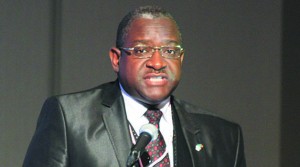By KAIKO NAMUSA-
GOVERNMENT will recover any losses incurred during the sale of Konkola Copper Mine (KCM) to Vedanta Resources in 2004, Mines Energy and Water Development Minister Christopher Yaluma has said.
KCM was sold to Vedanta Resources in 2004 at a cost of US$25million from a sale price of US$400 million.
A YouTube video has been leaked allegedly showing Vedanta chairperson Anil Agarwal boasting that ‘KCM was bought for a song’.
The matter was currently being investigated but Mr Yaluma said Government would not repossess the mine especially that it was in a poor state.
“Whatever money was lost during the sale, it shall be recovered. KCM is not going anywhere. It will be here today and it will be here tomorrow. Maybe his speech (Vedanta chairperson) was aimed at us to give him the boot but we will not.
“We are on track to stop the exploitation in the mining sector, we have been mining since 1931 and yet we have been ripped off, we have to correct this situation and we are starting now,” Mr Yaluma said.
Additionally an audit carried out on the operations of KCM revealed that the company was poorly managed and heavily indebted to the tune of US$1.567 billion and threatened with insolvency.
Mr Yaluma attributed the problems at the mine to non-compliance by Vedanta to inject US$397million into KCM as Foreign Direct Investment.
Mr Yaluma said the audit technical committee was set up after KCM planned to retrench 1, 529 employees, claiming this was necessitated by the planned mechanisation of mining methods.
He also said that development agreements entered into with mine owners had been done away with as this policy did not benefit the country.
He said during a public discussion in Lusaka yesterday that as of September 30, last year, KCM’s total liabilities of US$1.567 billion exceeded current assets by US$123million consequently, the mine had failed to meet its obligations.
“The liabilities included bank loans, local and foreign suppliers and contractors, ZCCM-IH Copper and Cobalt price participation, deferred taxes and outstanding bank guarantees to cover environmental liabilities for mining operations,” he added.
He said the mismanagement was also evidenced by the high turnover of chief executive officers and a high exodus of skilled Zambian professionals and poor corporate governance.
He said the mine lacked investment to develop new ore sources and provide sustainable feed for the efficient and cost effective running of processing facilities and failure to achieve the finished copper production target set at the time of acquiring assets.
Mr Yaluma said Vedanta also lacked a strategic survival business plan despite the financial crisis the company was facing.
Following the problems, Government engaged Vedanta’s shareholders and KCM top management to find a lasting solution and design a business management plan targeting to incrementally ramp up production from 132,318 tonnes of finished Copper in 2013 to 178,994 tonnes by 2017.
He said the company committed to inject US$250 million into production operations and US$30million into smelter operations to improve the flow of concentrates.
In addition, Vedanta committed itself to provide a bank guarantee of US$400 million towards the outstanding loans that KCM owed.
The company also committed to settling the overdue credit balance owed to its suppliers and contractors amounting to US$111million.
On Government intervention to secure the employment of Zambians, Mr Yaluma said there would be no redundancies as a result of implementing the business plan.
“Government will monitor KCM through quarterly progress reports on implementing the business plan and we are determined to ensure operations are turned around,” he said.
Meanwhile, CHARITY MOONGA reports that Former President Levy Mwanawasa’s private secretary for policy and project monitoring, Jack Kalala has defended the sale of Konkola Copper Mine (KCM) at US$25million.
Mr Kalala said at a media briefing yesterday that the Zambian Government at that time was forced to sell the mine to qualify under the Highly Indebted Poor Countries (HIPC) initiative.







